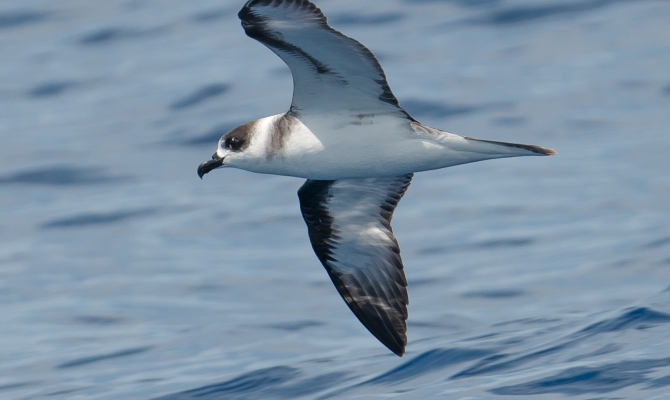
Gadfly petrels or Pterodroma are a genus of about thirty-five species of petrels, part of the seabird order. They are aptly named for their speedy, weaving flight which is also reflected in its name Pterodroma, from Ancient Greek, where pteron, ‘wing’ and dromos, ‘runner’. The Pacific region is home to twelve of the thirty-five species.
The importance of this group of seabirds in the Pacific was highlighted at a side event at the Fourteenth Meeting of the Conference of the Parties (COP14) to the Convention of the Conservation of Migratory Species of Wild Animals (CMS), held on 12-17 February 2024 in Samarkand, Uzbekistan.
The CMS is an environmental treaty of the United Nations, providing a global platform for the conservation and sustainable use of migratory animals and their habitats. The Convention brings together the States through which migratory animals pass, the Range States, and lays the legal foundation for internationally coordinated conservation measures throughout a migratory range.
There are six signatories to the CMS from the Pacific, they are Australia, the Cook Islands, Fiji, New Zealand, Palau and Samoa. However, many more Pacific island countries and territories are members of daughter agreements of the CMS, such as the Dugong, Cetacean and Shark Memorandums of Understanding.
The Secretariat of the Pacific Regional Environment Programme (SPREP) works across the Pacific region to support the conservation and sustainable use of migratory animals and their habitats. During the 2023 SPREP Meeting, Members endorsed the Pacific Islands Regional Marine Species Programme for 2022-2026. The Programme includes the first ever Seabird Action Plan (SAP) for the Pacific region, where the plan specifically identifies the CMS as a vehicle for international cooperation for seabirds in the Pacific.
SPREP Threatened and Migratory Species Adviser, Ms Karen Baird, provided a virtual presentation to a side event at the CMS COP, where she highlighted the importance of Oceania gadfly petrels and the value of listing them on CMS appendices. Gadfly petrels face mounting threats in the Pacific, including unsustainable harvesting, light pollution, bycatch, habitat loss, climate change and invasive alien predators such as rats. The lack of knowledge of where some species are breeding makes conservation difficult, such as the critically endangered Fiji and Beck’s petrels.
SPREP has committed to addressing these threats by supporting actions to implement the SAP. Work is currently underway to develop a Pacific seabird monitoring manual and provide training to practitioners working in the field. Ms Baird stressed the importance of this, she said “building capacity for Pacific island countries and territories and establishing partnerships between scientists and traditional knowledge holders is critical for species conservation”.
One example is the Pacific BioScapes Programme through which SPREP is supporting a rat eradication project being implemented by BirdLife Pacific on Christmas Island in Kiribati targeted at the conservation of the endangered Phoenix petrel.
The current state of gadfly petrels in the Pacific and the extensive work across the region for the conservation of the species provides a foundation for the listing on the CMS appendices. The next steps need to ensure a coordinated approach from the Pacific islands, conservation agencies and donor partners. Metropolitan countries like United States, United Kingdom and France must consult effectively with their territories to gain support and also consider offering funding support for further conservation actions. Ms Baird supported this during her presentation, she said “consultations with Pacific islands and countries and territories with populations of this species group will be important. Listing on CMS is only the beginning and gaining Pacific government support for increasing cooperative conservation actions is the goal”.
Other key outcomes for the Pacific at the CMS COP14 included a new action plan for Hawksbill turtles, a strengthened mandate of tackling bycatch and aquatic wild meat, a global concern for small cetaceans, sharks, marine turtles, and seabirds as well as new concerted actions for blue sharks.
For more information on Oceania gadfly petrels please contact, SPREP Threatened and Migratory Species Adviser, Ms Karen Baird at [email protected]
To watch the presentation on ‘Gadfly petrels in Oceania’ at CMS COP14, visit: https://library.sprep.org/content/rare-petrels-oceania-proposal-listing-gadfly-petrels-oceania-cms
To read the Pacific Islands Regional Marine Species Programme 2022-2026, visit: https://www.sprep.org/publications/pacific-islands-regional-marine-species-programme-pirmsp-2022-2026